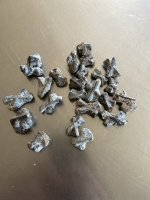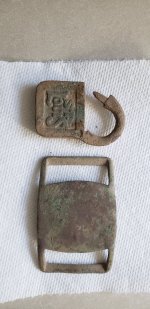DeepseekerADS
Gold Member
- Mar 3, 2013
- 14,880
- 21,725
- Detector(s) used
- CTX, Excal II, EQ800, Fisher 1260X, Tesoro Royal Sabre, Tejon, Garrett ADSIII, Carrot, Stealth 920iX, Keene A52
- Primary Interest:
- Other
Dr. Virend Somers, a Cardiologist from the Mayo Clinic, and a lead author writes:
Most heart attacks occur in the day, generally between 6 A.M. and noon. Having one during the night, when the heart should be most at rest, means that something unusual happened. Somers and his colleagues have been working for a decade to show that sleep apnea is to blame.
If you take an aspirin or a baby aspirin once a day, take it at night. The reason: Aspirin has a 24-hour "half-life"; therefore, if most heart attacks happen in the wee hours of the morning, the Aspirin would be strongest in your system.
Aspirin lasts a really long time in your medicine chest for years, (when it gets old, it smells like vinegar).
Bayer is making crystal aspirin to dissolve instantly on the tongue. They work much faster than the tablets. Why keep Aspirin by your bedside? It's about Heart Attacks.
There are other symptoms of a heart attack, besides the pain on the left arm. One must also be aware of an intense pain on the chin, as well as nausea and lots of sweating; however, these symptoms may also occur less frequently.
There may be NO pain in the chest during a heart attack. The majority of people (about 60%) who had a heart attack during their sleep did not wake up. However, if it occurs, the chest pain may wake you up from your deep sleep. If that happens, immediately dissolve two aspirins in your mouth and swallow them with a bit of water. Afterwards: Call 911.
Phone a neighbor or a family member who lives very close by. Say "heart attack!" Say that you have taken 2 Aspirins.
Take a seat on a chair or sofa near the front door, and wait for their arrival and DO NOT LIE DOWN!
Most heart attacks occur in the day, generally between 6 A.M. and noon. Having one during the night, when the heart should be most at rest, means that something unusual happened. Somers and his colleagues have been working for a decade to show that sleep apnea is to blame.
If you take an aspirin or a baby aspirin once a day, take it at night. The reason: Aspirin has a 24-hour "half-life"; therefore, if most heart attacks happen in the wee hours of the morning, the Aspirin would be strongest in your system.
Aspirin lasts a really long time in your medicine chest for years, (when it gets old, it smells like vinegar).
Bayer is making crystal aspirin to dissolve instantly on the tongue. They work much faster than the tablets. Why keep Aspirin by your bedside? It's about Heart Attacks.
There are other symptoms of a heart attack, besides the pain on the left arm. One must also be aware of an intense pain on the chin, as well as nausea and lots of sweating; however, these symptoms may also occur less frequently.
There may be NO pain in the chest during a heart attack. The majority of people (about 60%) who had a heart attack during their sleep did not wake up. However, if it occurs, the chest pain may wake you up from your deep sleep. If that happens, immediately dissolve two aspirins in your mouth and swallow them with a bit of water. Afterwards: Call 911.
Phone a neighbor or a family member who lives very close by. Say "heart attack!" Say that you have taken 2 Aspirins.
Take a seat on a chair or sofa near the front door, and wait for their arrival and DO NOT LIE DOWN!




